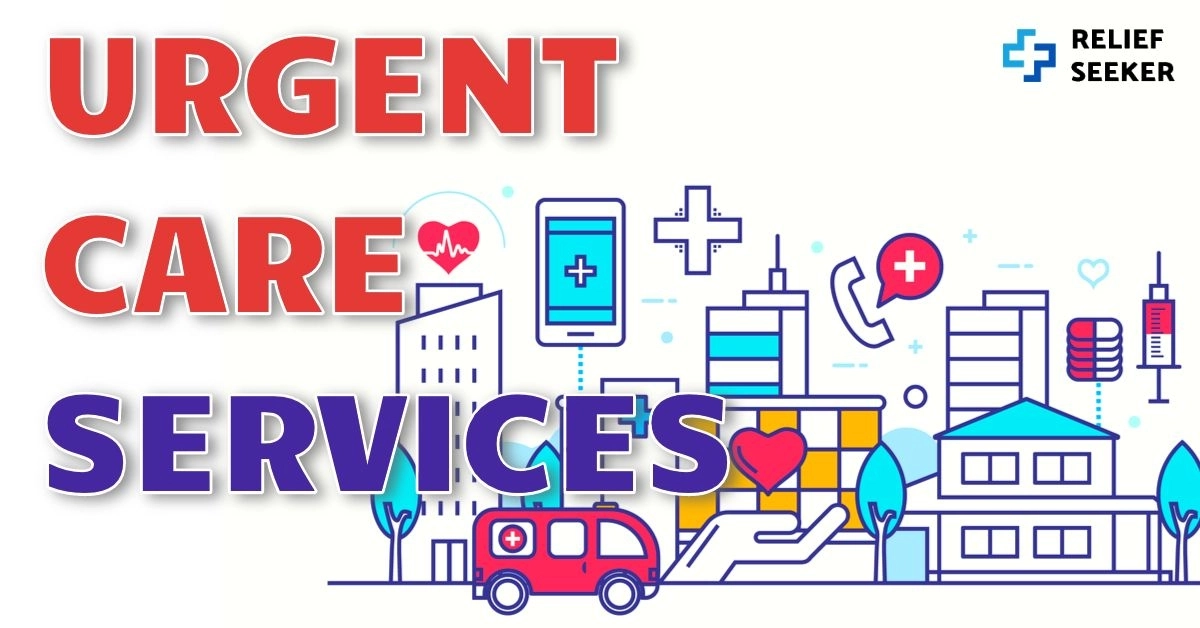Urgent care centers provide various medical services and treat many non-life-threatening conditions, ranging from minor cuts or bites, vaccinations, stomach issues, and diagnostics such as lab work. Urgent care centers have become essential, on-demand healthcare options. According to the Urgent Care Association, there are over 9,600 facilities throughout the U.S., making it super easy to find a center near you.
Services Offered At Urgent Care
Before we start, it’s important to note that each clinic can differ slightly in what they have to offer. However, most urgent care centers provide the same high-quality services nationwide.
Services provided by urgent care centers:
Non-life-threatening conditions
Minor physical injuries
Vaccinations
Sexually Transmitted Disease (STD) and Sexually Transmitted Infections (STI) testing
Lab Services
Preventative health services
IV or medication administration
Non-Life-Threatening Conditions
The most common thing you’ll see people going to urgent care for non-life-threatening illnesses or the symptoms that come with those illnesses. Urgent care is there for you if you aren’t sure if your runny nose is the flu or merely seasonal allergies. Or, if you’ve been up all night with your son’s “tummy ache,” and he just vomited all over your favorite Egyptian cotton sheets, urgent care is the place to go, even if it’s 3 a.m.
The most common conditions treated at urgent care include:
Flu-like or cold symptoms
COVID-19 symptoms
Allergic reactions
Ear infections
Sinus pressure and sinus infections
Bronchitis
Coughing, sneezing, or wheezing
Bloody noses
Nausea, diarrhea, or vomiting
Headaches
Unexplained pain or swelling
Rashes and itching
Minor Physical Injuries
As a rule of thumb, urgent care centers are ideal for non-life-threatening injuries. So, if you’ve fallen off the roof putting the holiday lights on the house and one of your arm bones has broken through the skin, you’ll most likely want to go to your closest emergency room or call 911.
Other minor injuries urgent care can take care of include:
Burns
Lacerations
Sprains
Small fractures
Cuts
Animal bites
Keep in mind that most urgent care centers employ at least 30% of their staff specifically trained in emergency medicine to treat the above conditions.
Vaccinations
One of the most incredible things about urgent care is its scheduling convenience. Let’s say you’re unable to make an appointment to see your primary care physician (PCP) for a seasonal flu shot; urgent care has your back. Urgent care centers can also administer region-specific vaccines, such as a vaccine for Malaria for those planning an international trip.
STD and STI Testing
One of the essential services offered by urgent care centers is STD and STI testing. For some, this is a very uncomfortable topic to discuss with others, but keeping your sexual health in check is one of the best things you can do. Urgent care centers are typically equipped with labs for easy testing, and most clinics are open late and on weekends, making it easy to make an online appointment or schedule a visit no matter how busy you think you might be.
Lab Services
Not only do urgent care centers provide patients with necessary sexual health tests, but they also offer various lab services to diagnose patients more accurately. These lab services may align with other treatments and are generally the same type of services provided in ERs or through your PCP.
Lab services can include:
Blood tests including glucose, comprehensive and basic metabolic panels, and complete blood counts
Pregnancy tests
Drug tests and screenings
Strep tests
Flu tests
Fecal blood occult
Electrolyte testing
Urinalysis
Preventative Health Services
Like we stated in the vaccination section, urgent care is great when you can’t nail down an appointment time with your PCP, gynecologist, pediatrician, or you’ve just moved to a new area and haven’t found a doctor yet.
Urgent care can also take care of your preventative health needs, including:
Physicals, such as school, sports, or annual
Gynecological exams
Well baby checks
The above wellness visits are just as crucial as emergency medical care, and most urgent care centers allow patients to make online appointments for easy scheduling.
IV and Medication Administration
All urgent care staff are medical professionals and are more than equipped to give you the best medical advice and offerings available. Depending on the circumstance, this may include an IV or medication being offered as treatment. This is case-by-case, but if it is determined that you require a specific prescription or are dehydrated and desperately need an IV, a trained staff member will be there to take care of you.
At-Home Urgent Care
Many urgent care clinics now offer at-home urgent care services (similar to the house calls doctors made in the olden days). It is now possible to be treated in the comfort of your home. Medical teams can provide quality care all through a mobile app.
Clinics will send a certified EMT (emergency medical technician) to your home to help facilitate a virtual visit with a doctor or registered nurse. They can also provide COVID-19 testing if you’re experiencing COVID symptoms.
Best At-Home Urgent Care Providers
Right now, most at-home urgent care providers are only offering virtual appointments due to the Shelter-in-Place orders. If you need a medical professional sent to your home, we recommend contacting:
Please note that not all states or areas will have access to at-home services, so it’s best to contact your local urgent care center for more information.
Life-Threatening Conditions
Even though some of the staff at urgent care centers are trained in emergency medical practices, this does not mean you shouldn’t go to the emergency room if you’re experiencing a life-threatening condition. Please call 911 or go to the closest hospital, as urgent care centers are generally not equipped to deal with these types of situations.
Life-threatening conditions include:
Broken bones
Overdose
Excessive vomiting
Accidental poison ingestion
Severe animal bites
Uncontrollable bleeding
Seizures
Heart attacks


